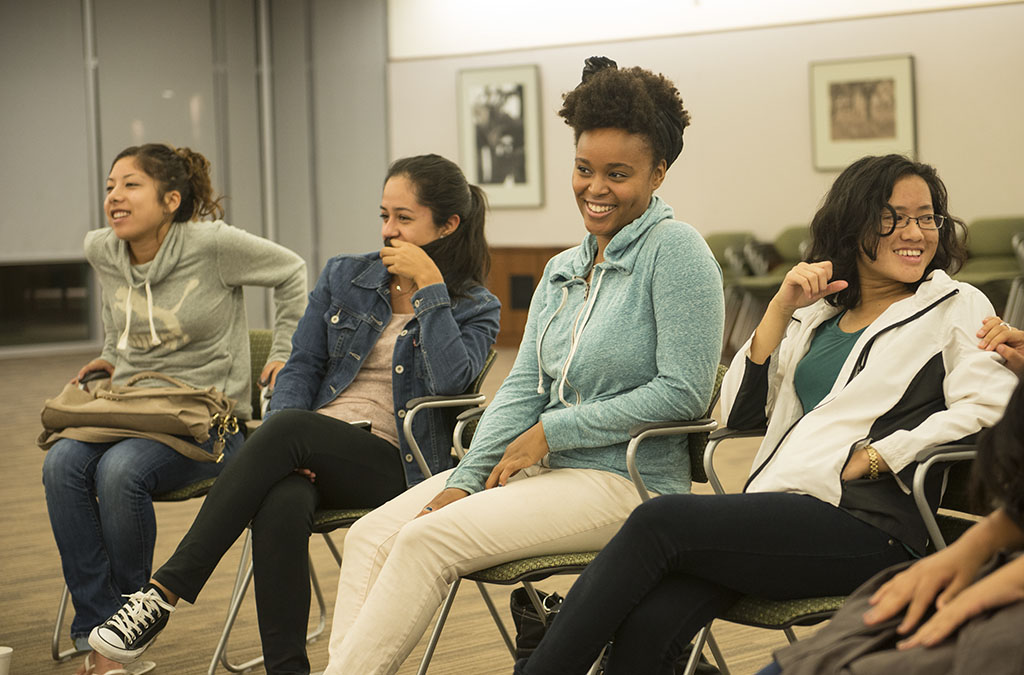
Junior Alex Palacios, sophomore Veronica Ibarra, senior Ciara Dines and senior Kim Davong listen intently to the speakers during Unidos, a club on campus that celebrates what it means to be Latino within a Christian community. Unidos' next event will be Latino Cultural Night on Friday, October 11. | Kalli Thommen/THE CHIMES
In celebration of National Hispanic Heritage month, Biola’s Latin American culture club, Unidos, is holding Latino Cultural Night on Friday, Oct. 11 from 6-9 p.m. Located between Rose Hall and Talbot East, the event is open to all students.
HISPANIC HERITAGE MONTH FOR ALL RACES
“It’s not even necessarily just for Hispanics, and that’s what we’re trying to really get across to Biola. We’re trying to make a comfortable place for Hispanics, but it’s also a place where we want to invite other cultures … to come and to learn about us,” said senior sociology major Malinda Sandoval, who runs marketing for Unidos.
Tables that represent six different countries will highlight and celebrate the diverse cultures in Latin America, said Unidos co-president and sophomore intercultural studies major Carla Veliz.
“There’s this beauty in each other’s culture within there, in which God has made himself known,” she said.
The cultures of El Salvador, Guatemala, Mexico, Colombia, Honduras and Puerto Rico will be represented at a table where visitors can talk to a student about the country.
Students at each table will provide information about each culture, including things that people can pray for specific to the country, Veliz said. The Honduras Water Project and Tijuana Ministry will attend to share struggles they have seen while working in Honduras and Mexico, respectively.
A NIGHT OF FOOD AND WORSHIP
Christians tend to overlook the need for Jesus in many Latin American countries because it is assumed that they are Catholic, said Unidos secretary and senior elementary education major Lydia Mena. She said that she hopes to confront this idea at Latino Cultural Night by talking about other beliefs that exist in Latin America, like the practice of Santeria in Puerto Rico.
“Even though [the country is] Catholic, it’s really involved with magic and the resurrection of the dead, stuff like that. We’re trying to get people to pray for them, too,” she said.
In addition to facts, Latino Cultural Night will share food with attendees. Empanadas, tamales, and El Salvadorian horchata and pupusas are a few of the traditional items that will be provided, Veliz said.
Worship music sung in Spanish and English, praise-dancing performances, student testimonies and a piñata will finish up the night, Veliz said.
The testimonies will feature a male and female student, each sharing how their experience of being Christian and Latino has shaped them, Mena said.
Unidos members hope to make people at Biola aware of the many cultures that exist within the larger Latino culture, and teach them about the cultures’ unique characteristics, Sandoval said.
Both Veliz and Sandoval spoke about the desire to change a common misconception that all Latinos are Mexican.
“Sometimes, people feel stereotyped … We want to represent each country and make each Hispanic here on campus feel valued and not like they’re just stereotyped as Mexicans because they’re brown,” Sandoval said.







